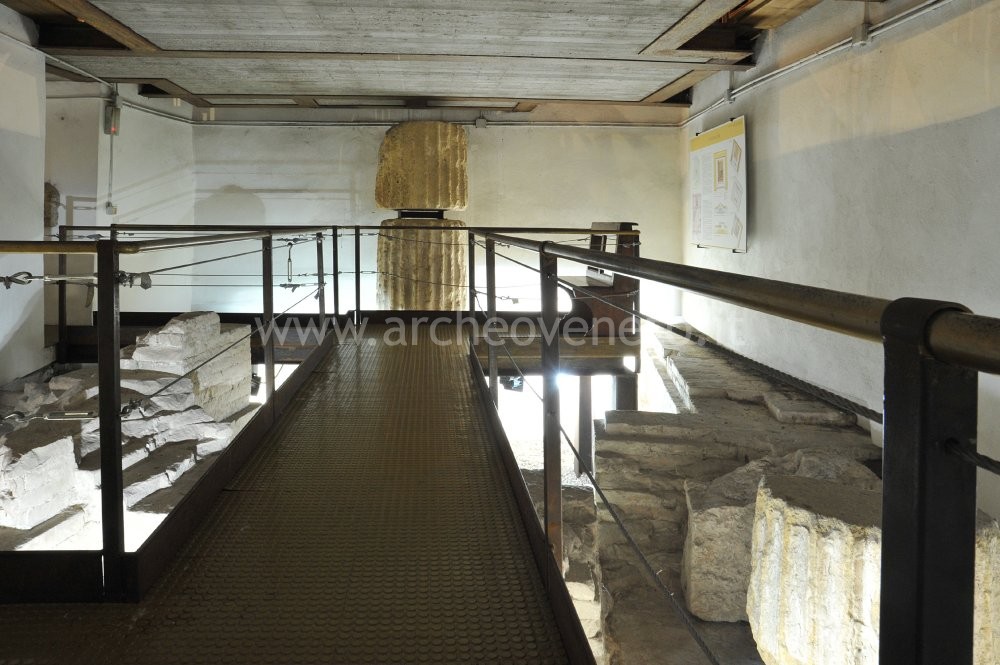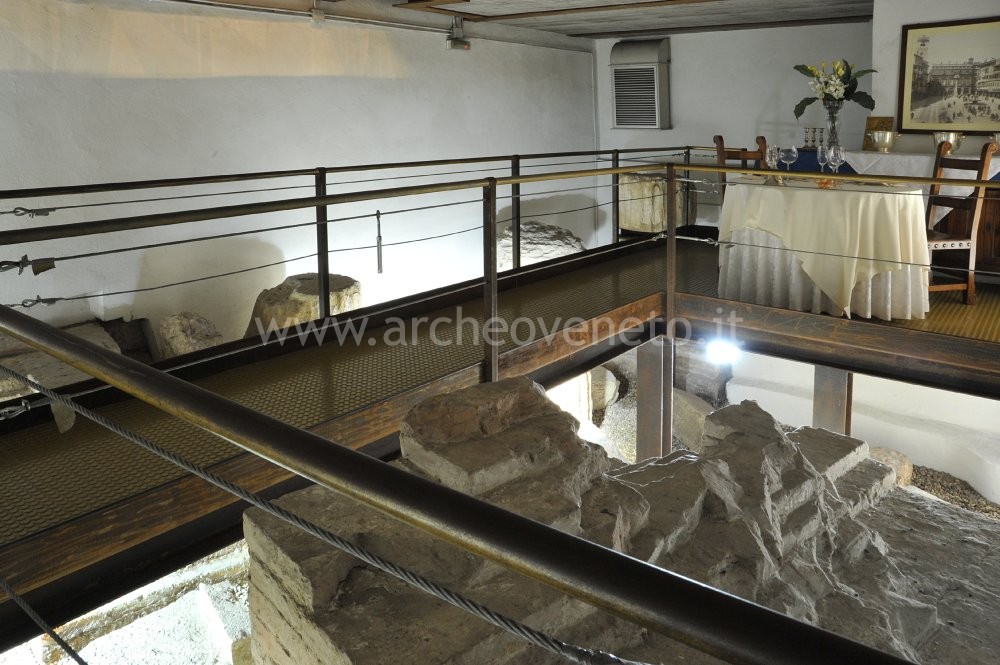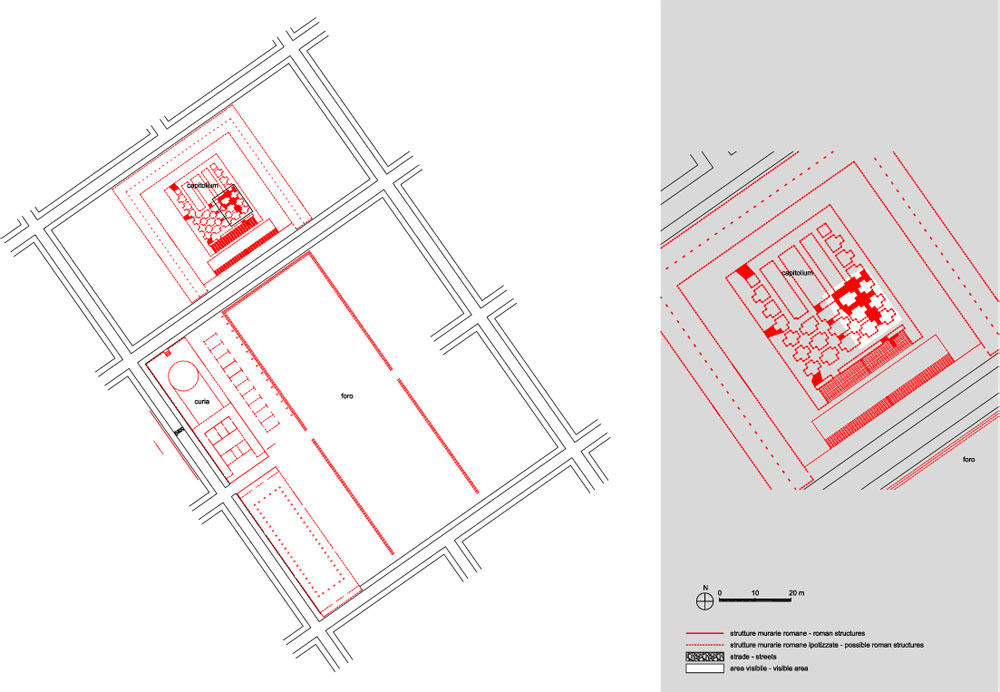|
|
File
Capitolium at the Restaurant “Maffei” – Verona
|
| Piazza delle Erbe 38 (Restaurant Maffei) – 37100 Verona (VR)
|
  |
|
Summary

The archaeological area in the basement of the “Maffei” restaurant conserves the remains of the Capitolium of Verona, the temple that was built in mid I century B.C. to celebrate the Capitoline Triad of Jupiter, Juno and Minerva.
History of research
The most ancient finds at the “Maffei” palace date back to 1975, when during the renovation of the building the General Direction for Archaeological Heritage was informed about the recovery of an old structure. The excavations were carried out between 1983 and 1984 and led to the discovery of the Roman archaeological remains that are the object of this visit.
Urban and geographical context
Verona is located along the Adige river, where this enters in the Po plain, at about thirty kilometres east to the Garda lake. Its altitude is 59 metres above sea level and it is placed at the basis of the Lessini mountains. The Capitolium of Verona is located under the “Maffei” palace, on the north-western side of the modern square “Piazza delle Erbe”, which mostly traces out the ancient Roman forum of Verona.
Chronology
I century B.C. (mid) |

 The archaeological area in the basement of the “Maffei” restaurant conserves some remains of the Capitolium of Verona, the temple dedicated to the Capitoline triad (Jupiter, Juno and Minerva). The temple was located on the north-western short side of the forum and along the road “Via Postumia”. And it was built around 50 B.C., in a moment of overall urban renovation of Verona. The temple had been built over a large artificial terrace that raised 2 metres above the ground level, which was surrounded on three sides by a porch and which could be accessed through stairs. In the middle of this terrace, on a further podium 42 metres long and 35 metres large there was the Capitolium. The temple was rectangular shaped and of Tuscan order. It was divided into a “pronaos”, with three rows of 6 columns each, and into three deep cells of various dimensions where Jupiter, Juno and Minerva were worshipped. Of the Capitolium of Verona today it is possible to see the remains of the foundations of the “pronaos”, namely some brick blocks that supported the columns of the temple above. The archaeological area in the basement of the “Maffei” restaurant conserves some remains of the Capitolium of Verona, the temple dedicated to the Capitoline triad (Jupiter, Juno and Minerva). The temple was located on the north-western short side of the forum and along the road “Via Postumia”. And it was built around 50 B.C., in a moment of overall urban renovation of Verona. The temple had been built over a large artificial terrace that raised 2 metres above the ground level, which was surrounded on three sides by a porch and which could be accessed through stairs. In the middle of this terrace, on a further podium 42 metres long and 35 metres large there was the Capitolium. The temple was rectangular shaped and of Tuscan order. It was divided into a “pronaos”, with three rows of 6 columns each, and into three deep cells of various dimensions where Jupiter, Juno and Minerva were worshipped. Of the Capitolium of Verona today it is possible to see the remains of the foundations of the “pronaos”, namely some brick blocks that supported the columns of the temple above.
|

Admission: Negli orari di apertura
Visitability: Interno
Ticket: No
 School access School access
Opening Days
| Tipology |
When |
Specs |
| Only |
Friday |
12-14.30, 19.30-22.30 |
| Only |
Monday |
12-14.30, 19.30-22.30 |
| Only |
Saturday |
12-14.30, 19.30-22.30 |
| Only |
Thursday |
12-14.30, 19.30-22.30 |
| Only |
Tuesday |
12-14.30, 19.30-22.30 |
| Only |
Wednesday |
12-14.30, 19.30-22.30 |
| Summer |
Sunday |
12-14.30, 19.30-22.30 (from 15 March to 15 October) |
Recommended tour time (minutes): 20
 Toilet Toilet
 Information boards Information boards
 Guided Tours Guided Tours
| Cavalieri Manasse G. 1990, Il foro di Verona: recenti indagini, in La città nell’Italia Settentrionale in età romana, Atti del Convegno (Trieste, 13-15 marzo 1987), Trieste-Roma, pp. 579-616. |
| Archeologia a Verona 2000, a cura di Bolla M., Milano, pp. 39-43. |
| I luoghi della cultura 2006, Roma, pp. 385. |
| L’area del Capitolium di Verona: ricerche storiche e archeologiche 2009, a cura di Cavalieri Manasse G., Verona. |
|

